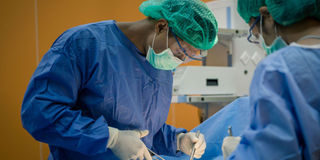Prime
Ugandan doctors to conduct first liver transplant

Medical workers conduct an organ transplant. PHOTO/COURTESY
What you need to know:
- Dr Olivia Kituuka, a liver transplant expert at Mulago Hospital, told this publication in an interview last Friday that there are three liver transplant specialists in Uganda
Liver transplant surgeons say they have started preparations to conduct the first liver transplant in Uganda around the end of this year, months after a successful kidney transplant at Mulago Hospital.
Dr Olivia Kituuka, a liver transplant expert at Mulago Hospital, told this publication in an interview last Friday that there are three liver transplant specialists in Uganda. She said they intend to have this liver transplant done in Lubaga Hospital because they have established the transplant unit.
“Towards the end of this year, we hope to have the first liver transplant. The liver transplant is for people who have problems with liver failure. Someone can have liver failure because they have cancer of the liver but it has not yet gone to other parts of the body,” she said.
“Then we can take off that liver and give that person [patient] part of the liver of another [healthy] person [donor]. The transplant can also be for a person whose liver is damaged because of drugs, alcohol or those who are poisoned and the liver can no longer function,” she added.
Earlier last month, Dr Julius Luyimbaazi, the director of Lubaga Hospital, said they are ready to do the organ transplants.
“One of the services that we can provide alongside government is organ transplant. We are ready. We have the personnel, the equipment and skills. Everything is set for us. All that we require now is for the Ministry of Health to come and accredit us and designate us as a transplant centre,” he said.
In August last year, Dr Henry Mwebesa, the Director General of Health Services at the Health Ministry, commissioned a Shs1b Dr Rita Moser Transplant Theatre at Lubaga Hospital. He also noted that the ministry was awaiting the Uganda Organ Donation and Transplant Council to assess the standards of the facility.
Mulago Hospital was able to perform the first organ transplant last December successfully, placing a healthy kidney in a patient. Doctors at Mulago Hospital said this month that the patient and donor are in good health following the transplant.
Dr Kituuka, however, said the cost of a liver transplant tends to be higher than that of a kidney transplant. “The cost of a liver transplant is about $100,000 (about Shs388,487,550). But if we are doing it here [in Uganda], it will be much less but still it is not a very cheap thing because it is more complex than a kidney transplant,” she said.
Dr Kituuka added that the liver of a person who donates part of their liver to the patient takes around six months to grow back to full size. She said they are monitored more closely than someone who donated a kidney because around half of a donor’s liver is cut to obtain the portion to be transplanted into a patient.
Doctors in transplant
Dr Kituuka said one of the key people trained in liver surgery works in Lubaga Hospital and they have been able to get support to set up the unit that will enable us to conduct the first liver transplant.
“We were all trained in India. We have Dr Michael Okello and Dr Vianney Kweyamba and myself (Dr Olivia Kituuka) who can do liver transplant,” she said.
Organ transplants are done with other medical people such as nurses, laboratory scientists and social workers because of several issues involved in patient preparation, surgery and post-surgical care.
Dr Kituuka is a lecturer at Makerere University College of Health Sciences and also a surgeon based at Mulago Hospital.
“I specialise in intestinal issues, problems of the liver, pancreas, and gallbladder. I do surgery in those areas. That is why I am also trained in liver transplantation. I also do minimally invasive surgery [keyhole surgery] –surgery done without making big cuts. We make small cuts and we operate using a camera without having to make big wounds,” she explained.




